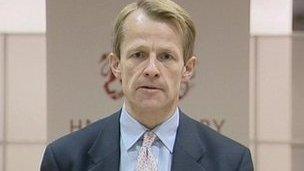David Laws calls for cut in state spending
- Published

Mr Laws said the Liberal Party's founding fathers would have been shocked by spending levels
State spending is too high and likely to be leading to "waste and inefficiency", ex-Liberal Democrat Cabinet minister David Laws has said.
Mr Laws said the public sector's share of the economy should be cut to 35% from the 49% it reached in 2010-11.
It needed to be "back in kilter with the amount of tax people are prepared to pay", he told the <link> <caption>Sunday Telegraph</caption> <url href="http://www.telegraph.co.uk/news/politics/liberaldemocrats/9351623/Liberal-Democrat-David-Laws-pushes-for-deeper-tax-and-spending-cuts.html" platform="highweb"/> </link> .
His call goes further than that of Commons Treasury committee chairman Andrew Tyrie who wants a 40% share.
Mr Laws resigned as chief secretary to the Treasury two years ago after admitting he claimed expenses to pay his partner rent.
'Shocking spending levels'
In his interview with the Telegraph, the Lib Dem backbencher said the founding fathers of the Liberal Party would have been shocked by spending levels.
"Even after the existing fiscal consolidations, state spending will account for some 40% of GDP, a figure that would have shocked not only Adam Smith, William Gladstone, and John Stuart Mill, but also John Maynard Keynes and David Lloyd George," he said.
"The implication of the state spending 40% of national income is that there is likely to be too much resource misallocation and too much waste and inefficiency."
In an article being published on Monday by the Institute of Economic Affairs, Mr Laws will also call for "lower marginal rates of tax at all income levels", a simplified tax system and a "substantial" rise in the personal income tax threshold.
Lib Dem Business Secretary Vince Cable last week said government spending was increasing as a share of the UK economy, rather than decreasing as planned.
UK public spending as a share of the economy tends to rise during recessions, as the size of the economy contracts. It fell as low as 36.3% in 1999/2000, rising to 47.7% a decade later.
It has been projected to fall to below 40% again by 2016/17.
- Published20 June 2012
- Published19 June 2012
- Published18 June 2012
- Published15 June 2012
- Published8 May 2012
- Published23 April 2012